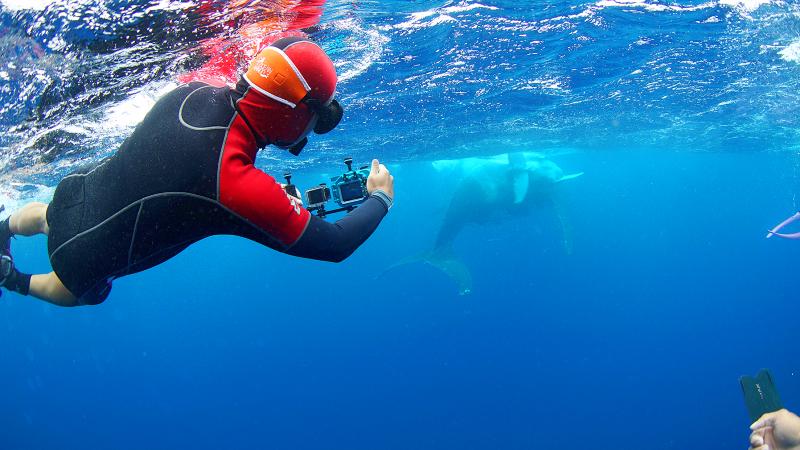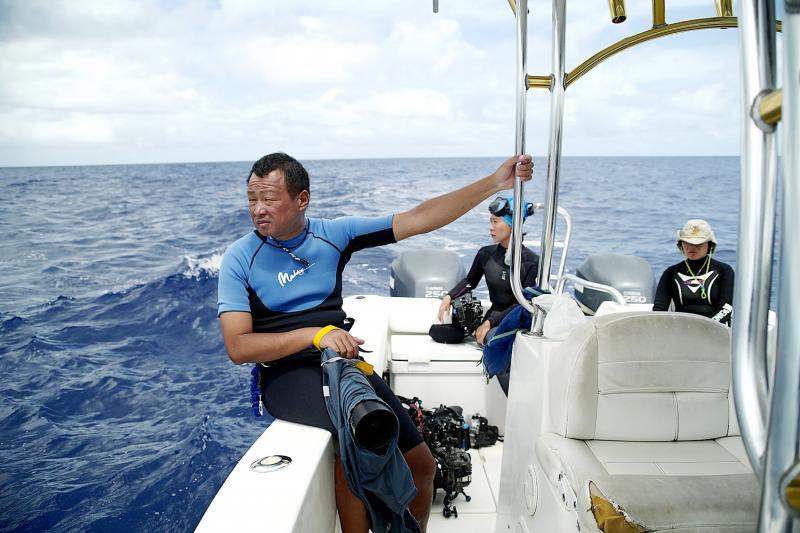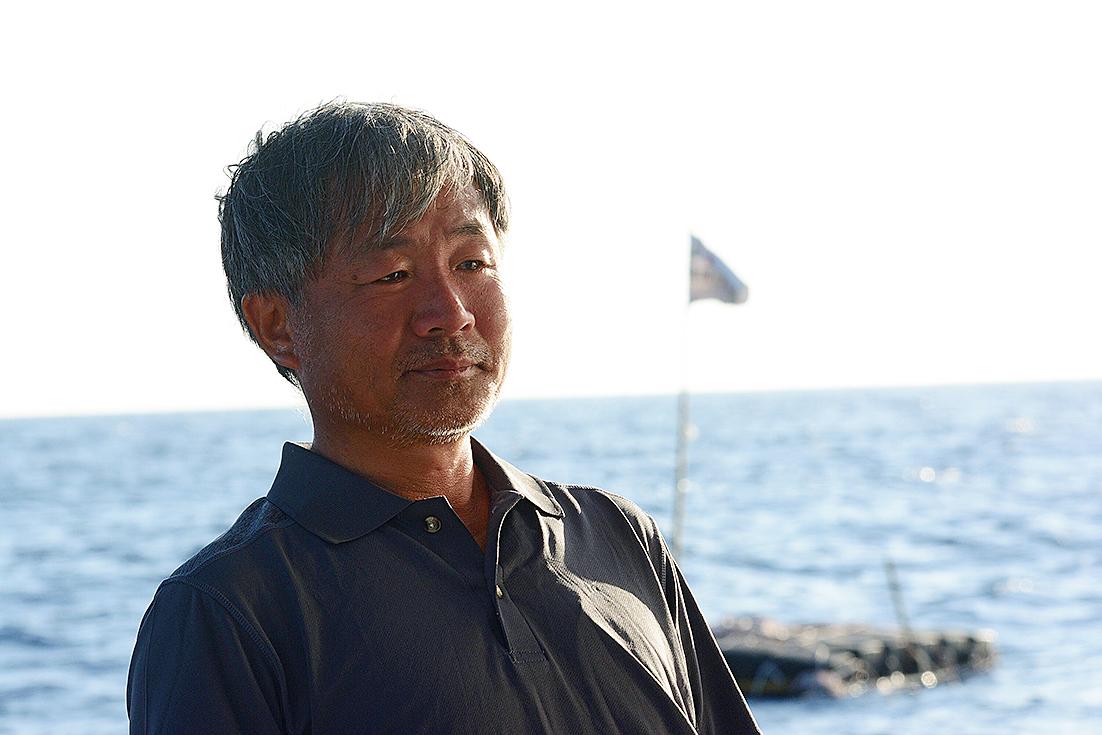Even though Taiwan is surrounded by the ocean, its people have turned their backs on the sea for too long, writer and marine advocate Liao Hung-chi (廖鴻基) says in the documentary Whale Island (男人與他的海). Liao laments that due to a multitude of social and political factors, most Taiwanese don’t understand the ocean, which is often walled off by concrete tetrapods or coastal industrial zones. Through his life’s work, he hopes that Taiwanese can face the waves head on — both literally and figuratively.
Beautifully shot by documentary filmmaker Huang Chia-chun (黃嘉俊), this tender and majestic ode to the sea follows Liao and Taiwan’s first underwater whale photographer Ray Chin (金磊) on their respective adventures, diving deep alongside them not just into the waters but into their souls, which yearn for freedom.
Huang’s footage of the sea and its creatures is absolutely stunning, especially on the big screen, but this isn’t one of those films that just shows pretty pictures for two hours. It is Liao and Chin’s burning passion, their thoughtful musings and their relationships with the families they leave behind on land that present a compelling story. A literal translation of the Chinese, “Man and His Ocean,” may be more apt here as that’s what it’s really about. The two men don’t own the ocean or try to tame it, of course, but it belongs to them in an immensely personal way that drives their entire existence.

Photo courtesy of Activator Marketing Company
The two come from different generations and their stories don’t actually intersect in the film. Liao is on a months-long drifting voyage through the Kuroshio current, while Chin is photographing whales in the Kingdom of Tonga. The narrative is a bit disconnected at first since they’re doing unrelated things, but soon the parallels emerge.
As a writer, Liao’s narration is much more philosophical, but the two men share the same overwhelming attraction toward the deep blue. The film was originally meant to be a more abstract, formalist exploration of the ocean’s spirit through the two men, Huang says. But the birth of his daughter during the editing process prompted him to refocus a significant portion of the film toward their relationship with their loved ones.
He is able to draw honest and introspective confessions from both Liao and Chin and, as a result, their struggles to balance family life with their intrepid spirit, which becomes the unifying theme.

Photo courtesy of Activator Marketing Company
Chin tries to spend as much time as he can with his two young children when he is in Taiwan, and he is first seen playing with them at home while admitting that childrearing is not an easy task. The interactions between the family are raw and genuine, however, and set the scene for Chin’s eventual departure to Tonga.
Liao, on the other hand, chose the ocean over his family years ago, and while he doesn’t regret it, he is seen trying to reconnect with his grown daughter (who has mostly eschewed the ocean out of spite for her father) throughout the film. In addition to addressing the disconnect Taiwanese feel toward the ocean, Liao also embodies the common alienation many parents feel toward their children.
Whale Island definitely would not have been as powerful without this family element, as it further connects the two storylines and makes the subjects more layered and relatable. On the surface, the two seem to be relentlessly chasing their ideals, but reality is never that simple; there’s always some sacrifice or regret.

Photo courtesy of Activator Marketing Company
The film’s pacing, emotional depth and visual appeal leave little to complain about, and renowned folk singer Lin Hsiang-sheng (林生祥) rounds out the production with a calm and meditative soundtrack that fits the spirit well.

In the March 9 edition of the Taipei Times a piece by Ninon Godefroy ran with the headine “The quiet, gentle rhythm of Taiwan.” It started with the line “Taiwan is a small, humble place. There is no Eiffel Tower, no pyramids — no singular attraction that draws the world’s attention.” I laughed out loud at that. This was out of no disrespect for the author or the piece, which made some interesting analogies and good points about how both Din Tai Fung’s and Taiwan Semiconductor Manufacturing Co’s (TSMC, 台積電) meticulous attention to detail and quality are not quite up to

April 21 to April 27 Hsieh Er’s (謝娥) political fortunes were rising fast after she got out of jail and joined the Chinese Nationalist Party (KMT) in December 1945. Not only did she hold key positions in various committees, she was elected the only woman on the Taipei City Council and headed to Nanjing in 1946 as the sole Taiwanese female representative to the National Constituent Assembly. With the support of first lady Soong May-ling (宋美齡), she started the Taipei Women’s Association and Taiwan Provincial Women’s Association, where she

It is one of the more remarkable facts of Taiwan history that it was never occupied or claimed by any of the numerous kingdoms of southern China — Han or otherwise — that lay just across the water from it. None of their brilliant ministers ever discovered that Taiwan was a “core interest” of the state whose annexation was “inevitable.” As Paul Kua notes in an excellent monograph laying out how the Portuguese gave Taiwan the name “Formosa,” the first Europeans to express an interest in occupying Taiwan were the Spanish. Tonio Andrade in his seminal work, How Taiwan Became Chinese,

Mongolian influencer Anudari Daarya looks effortlessly glamorous and carefree in her social media posts — but the classically trained pianist’s road to acceptance as a transgender artist has been anything but easy. She is one of a growing number of Mongolian LGBTQ youth challenging stereotypes and fighting for acceptance through media representation in the socially conservative country. LGBTQ Mongolians often hide their identities from their employers and colleagues for fear of discrimination, with a survey by the non-profit LGBT Centre Mongolia showing that only 20 percent of people felt comfortable coming out at work. Daarya, 25, said she has faced discrimination since she